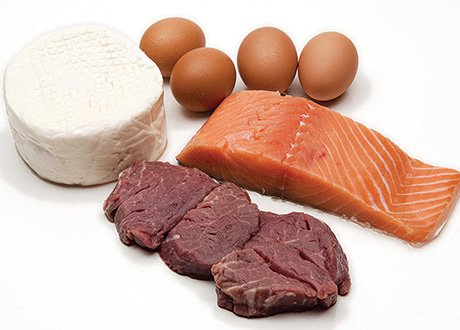CALCULATING PROTEIN REQUIREMENTS
Unfortunately when it comes to various nutrients, the one size fits all approach doesn’t always work. For example, a sedentary individual’s protein requirements will vary significantly from a high level athlete. So how do we find the correct amount of protein for individuals of different activity and fitness levels? According to the RDA, we need .8 grams of protein per kg of body weight (a kg is 2.2 pounds). However this number is often too low. Especially for those engaged in a strenuous exercise program. So before calculating the exact number of protein grams, it’s important to look at the individuals activity level, intensity training level, and goals.
When it comes to exercise, it’s not all equal in regards to protein. For example some engaging in low/moderate intensity exercise (i.e. walking) for 2-3 hours a week will require a lot less protein than some engaging in 2-3 hours of mostly moderate/high intensity work. During high intensity exercise some amino acids (the building blocks of protein) are actually used for energy. So high intensity training like intervals, crossfit style workouts, and heavy weight training would require more protein.
Besides intensity of exercise – age, hormonal environment, and exercise history will also play a role. For example a younger male with higher testosterone levels engaged in strength training will require more protein to maximize muscle development than an older individual with lower testosterone levels. In addition individuals who are just beginning a strength training program have greater ability to build muscle mass than a seasoned trainer – so they could actually benefit from a slightly higher intake.
In addition to building muscle several studies have shown that higher protein diets are effective as part of a weight loss strategy. So if weight loss is part of you might want to tilt toward having a slightly higher intake of protein.
Taking all of this into account here are some general guidelines for protein consumption:
- If you are sedentary and not looking to change body composition much, a daily target of 0.8g/kg bodyweight (0.36g/lb of bodyweight) or slightly higher would suffice.
- Athletes/highly active individuals attempting to lose body fat while maintaining or slightly increasing lean muscle mass, a daily intake of 1.6-2.2g/kg bodyweight would be encouraged.
- Athletes/highly active or individuals who are attempting to lose body fat while preserving lean mass, a daily intake of 1.0-1.5g/kg bodyweight.
While determining the exact number amount of protein can be somewhat complicated, eating protein in the above amounts is generally considered safe. While most experts feel this amount is safe – individuals with kidney problems, gout, and people who don’t consume enough fluids might be want to talk to their doctor before consuming additional protein.
–
Glen Carrigan is owner/operator of Freedom 4 Life Fitness located in Leawood, KS. With his wife Yvette they have been helping residents of Leawood, Overland Park, and Greater Kansas City reach their health and fitness goals through diet and exercise.
